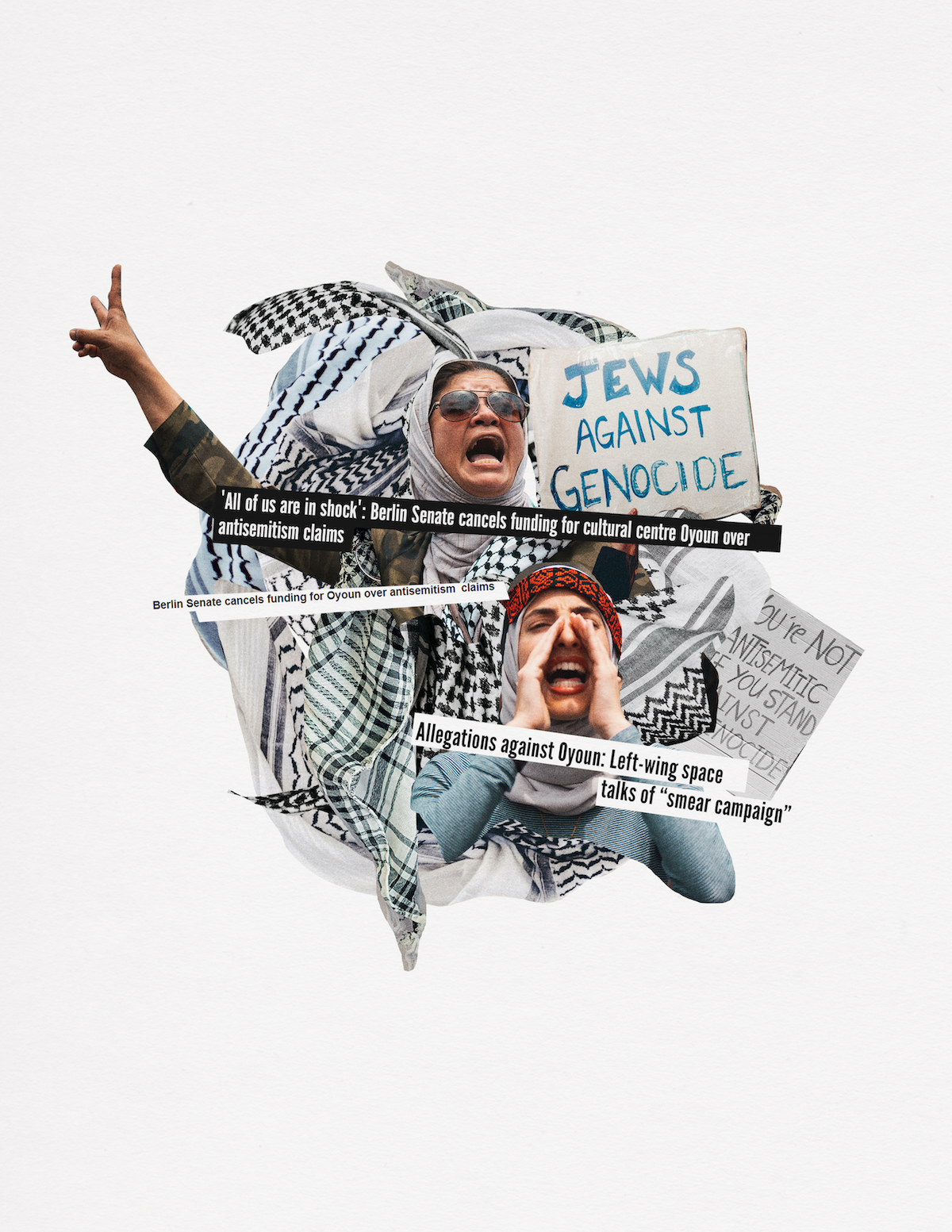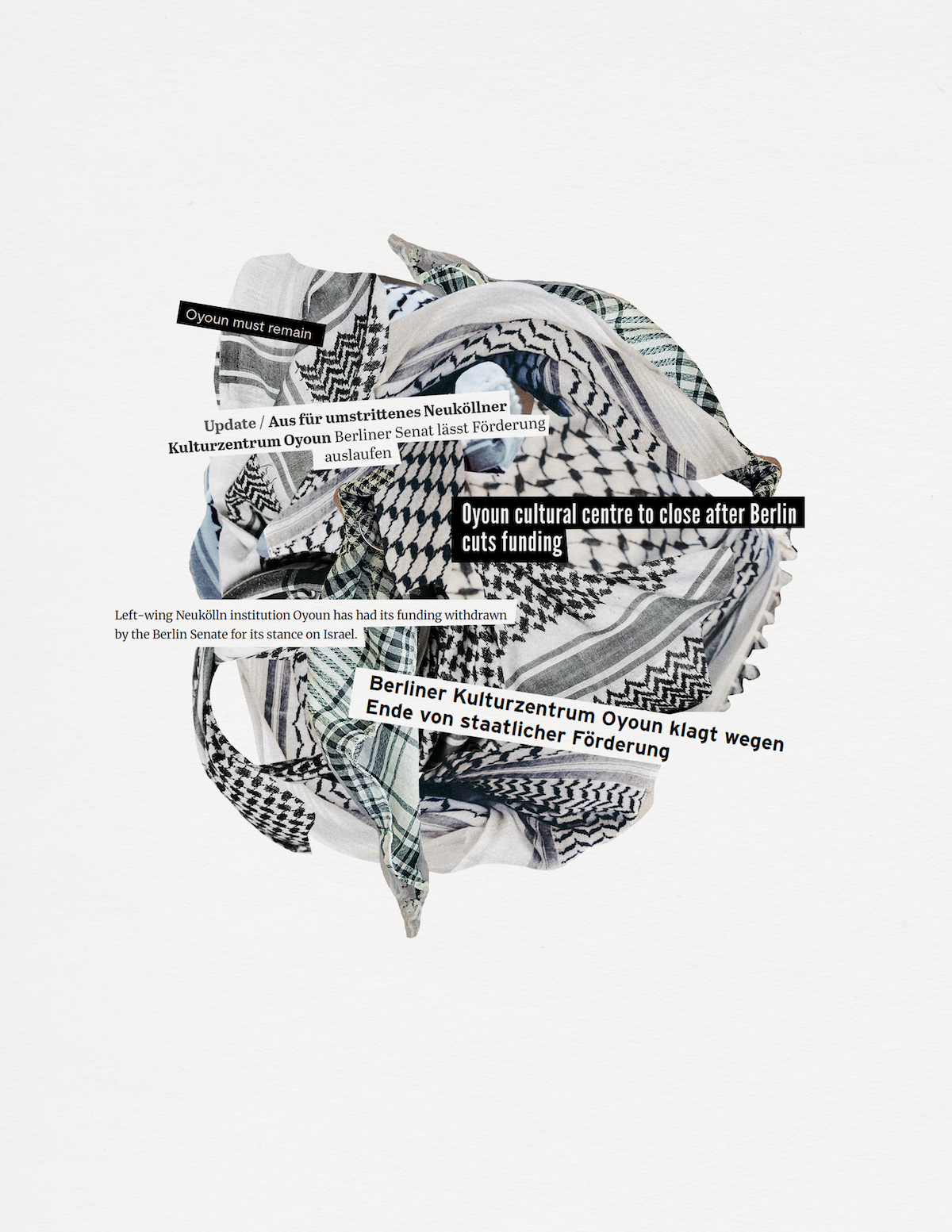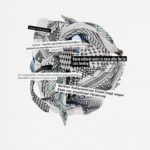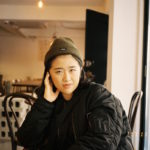YEOJA Mag sat down to chat with Louna Sbou - curator, mentor, culture manager, and…
Oyoun
the arts & culture venue facing defunding by the Berlin Senate15 February 2024
Oyoun is an arts & culture venue that has been committed to fostering queer*feminist and diasporic cultural diversity, promoting artistic freedom, and providing a platform for marginalized voices in Berlin's cultural landscape since its founding in 2020. Now, due to the current political climate in Berlin (and Germany as a whole) - namely, Germany’s unwavering pro-Isreali stance on the genocide being committed against the Palestinain people - the fate of Oyoun has been placed in uncertainty.
YEOJA Mag sat down to chat with Louna Sbou – curator, mentor, culture manager, and director of Oyoun – about Oyoun’s work, current struggle, and the logistical and factual difficulty social projects under a capitalist structure face, as even government funding does not secure safety or security:
For our readers who do not know what Oyoun is and what kind of work Oyoun does, can you give us an overview?
Oyoun: Oyoun conceives, develops, and implements artistic-cultural projects through decolonial, queer*feminist, and migrant perspectives. Oyoun creates space for critical debate, reflective experimentation, and transnational solidarity.
Oyoun serves as an intersectional platform for excellent diasporic and international art and culture and is a place that enables dialogue between local, national, and international issues on an artistic level.
In times of increasing populism and radicalisation, Oyoun is a place of critical reflection and empowering creativity. With its focus on content, Oyoun makes a fundamental contribution to being a counterweight to social developments – those of which threaten the cultural diversity of our society.
Oyoun’s physical location includes versatile spaces and fosters programmes which, since its opening in 2020, have served as a platform for exchange with various actors: both civil society communities and representatives from culture and politics. Oyoun provides space for conversations, encounters, and discussions that would not naturally happen in other places.
We perceive Oyoun’s (needed) position as bridging [the gap] between different identified actors: civil society communities as well as representatives from culture, industries, and politics.

Oyoun has abruptly lost its government funding due to accusations by the German government of antisemitism. For those that are not aware of the events that have led up to this defunding, can you explain to our readers what has been going on?
Oyoun: Our funding was abruptly withdrawn, with the official reason cited as the regular expiry of the funding period. However, this coincided with public debates around allegations of anti-Semitism, which we take very seriously.
There has been significant public discourse linking the loss of funding to our hosting of the visit by the Jewish Voice for Peace (JVP) on Nov 4th, 2023. On November 6th, 2023, the cultural senator Joe Chialo mentioned the review of our funding [came about as a direct] result of our event with JVP from Nov 4th, 2023, starting at 7.20min, here. Additionally, in response to questions submitted by Dr. Manuela Schmidt, a member of the main committee of the Hauptausschuss, Berlin’s state secretary for culture, Sarah Wedl-Wilson explicitly mentions the event of Nov 4th, 2023 with JVP as the cause for their inspections and subsequent review of our funding.
After receiving backlash which suggested that Chialo’s decision [to review our funding] was based on the assumption that both Oyoun and JVP were engaging in anti semitic activities, Chialo now claims the reason for our funding coming to an end is simply due to it “expiring“ at the end of 2023.
We are currently seeking clarity on these reasons, as they seem to conflict with our understanding of the agreement. However, all attempts to have a conversation or dialogue has been ignored by the senator and his administration.
We are committed to fostering a respectful and inclusive dialogue and unequivocally oppose any form of discrimination. Our work at Oyoun has always been rooted in challenging and deconstructing systems of oppression, and we believe our expertise in this area is instrumental in addressing and resolving such complex issues. This situation has raised important questions about the criteria and processes used in cultural funding decisions, which we hope will be part of an ongoing, constructive conversation.

It appears to us that using claims of anti-semitism due to the current genocide happening to the Palestinian people at the hands of the IDF and Israeli government is a conflation of Jewishness with anti-semitism, which are not and will never be one in the same. Additionally, Germany’s response to Black and Brown folx from or with origins outside of the global north with anti-zionist leanings seems to be particularly harsh. Was this Oyoun’s personal experience regarding recent interactions you have had with the state?
Oyoun: In our history, interactions with state authorities have often been challenging, yet they typically led to constructive outcomes. However, in these recent series of events, our commitment to inclusivity and diversity has been tested more than ever. We have actively sought dialogue, offering to share insights from our diverse cultural practices as valuable resources for shaping cultural politics. Unfortunately, as of now, our efforts for a meaningful exchange have been met with a concerning silence.
The particular position that Oyoun is dealing with is a position that a lot of community-based spaces who are reliant on government funding find themselves in time and time again – namely: If we do our best to exist outside of capitalist structures when seeking the monetary needs to run our projects and therefore turn to other options like government funding, what happens when our projects are not in alignment with the goals of the state? How do we continue to function when money is realistically needed in order to continue to operate?
Oyoun: Addressing this complex challenge requires a nuanced approach. At Oyoun, we are committed to critically engaging with paternalistic and capitalist structures, yet we recognize the indispensable need for financial support. Our queer*feminist perspective is vital in fostering greater societal equality by amplifying marginalized voices. While these perspectives may sometimes challenge governmental goals, we see this as a fundamental aspect of our cultural work. It’s essential for us to explore various funding sources, including governmental and non-profit avenues, to sustain our operations without compromising our core mission.

This is not only a general issue but quite a concrete one considering what happened to Oyoun’s funding and the new Antidiskriminierungsklausel der Berliner Kulturverwaltung which would change the definition of Antisemitismus. What does this mean for future cultural projects in Berlin and what are the dangers this precedent sets?
Oyoun: Even Rat der Künste as well as Meron Mendel among many other players are warning that the new Förderklausel could redefine cultural funding in Berlin, potentially limiting artistic freedom. We’re concerned about the precedent this sets for cultural expression, particularly regarding sensitive political topics.

There was a demo that took place on Monday the 8th in response to this at the Abgeordnetenhaus in Berlin. What was the goal of this demo, and were some of these achieved?
Oyoun: The demonstration aimed to center the possible limitations set by implementing the IHRA definition and the broader implications for artistic freedom in Berlin. The groups organising the demo ended up witnessing the withdrawal of the clause.
How do we „pick and choose our battles“ so to speak? When do we proceed with the actions we believe are ethically correct despite the consequences, and when do we have to accept certain limitations on our work and objectives in order to remain fighting another day?
Oyoun: As a central hub for our community, the luxury of ‘picking and choosing’ our battles is often not an option available to us, especially considering the limited privileges we navigate. In situations like these, it’s crucial to strike a balance between steadfastly upholding our ethical principles and adapting to practical realities. While sometimes concessions are necessary for our survival, our primary focus remains preserving our core values and mission. This approach is essential to safeguard and support our community effectively.
As Dami Choi (Oyoun member and a curator/cultural worker based in Berlin and in the Korean diaspora) said, “Becoming institutionalized comes with dehumanization — tokenism, censorship, reductionism and a potential stigmatization. It might give stability, for a while, but not security.” This is the case not only in a few corners of the non-profit sector, but in most of the socio-politically oriented and artistic-culturally organized movements, initiatives, and projects – Even more so if the organization is run by and centring marginalized bodies.
More than ever, we must stay vigilant against the system’s inevitable tendency to institutionalize effective grassroots movements.
We must be aware of the inherent precariousness that institutionalization entails. We should not, in equal measure, cease to demand the system to transform and the institutions to care. Organizations close to institutions should continue to exist to serve the community and to secure, albeit temporarily, the momentum to reclaim our place in this society. We must insist to the system that it’s their job to worry about our labor being paid.
The system, inherently, owes us.
In looking at alternative funding methods, what options are open to communities like ours? What is under our own control within our communities?
Oyoun: We are actively exploring various avenues for support, including community-based funding initiatives, grants from non-governmental organizations, and forming partnerships with institutions that share our vision and values. This approach is about harnessing our collective strength and delving into innovative funding models that align with our mission. Concurrently, we firmly reject any federal impositions that threaten freedom of speech and artistic expression. It’s crucial for us to maintain the integrity of our work while navigating these funding challenges.

What does the future look like for Oyoun as of now?
Oyoun: Despite current challenges, we’re optimistic. We’re working on securing alternative funding sources and continuing our mission. We remain committed to being a space for diverse cultural expression.
Can you please tell our readers what they can actively do to help support Oyoun and fight against the censure of artists who stand in solidarity with Palestine in a German context?
Oyoun: Support can come in many forms: We are glad if you keep being aware about the development and choose how to support us according to your resources; we recommend: Advocating for artistic freedom and standing in solidarity with oppressed communities within the German context, is crucial.
_
Parts of this interview were excerpts from the previously published, “Curation as community work in a hostile funding context”, a text written by curator Dami Choi written as Oyoun’s contribution for the project School of Commons. To visit oyoun on Instagram, please click here. Original artwork created by Katia Engell. For more articles about Berlin politics, please click here.








